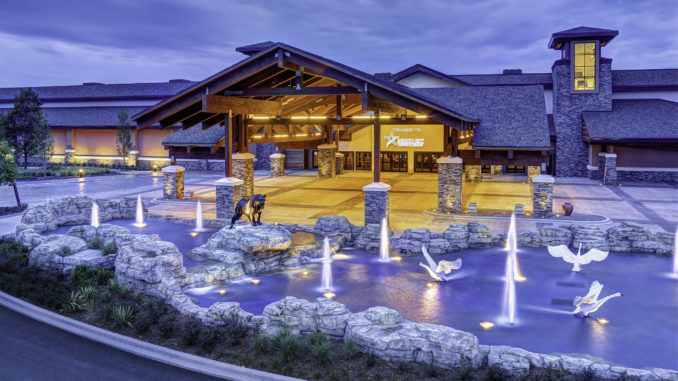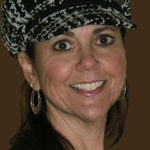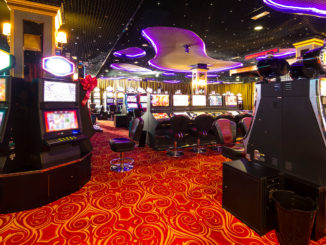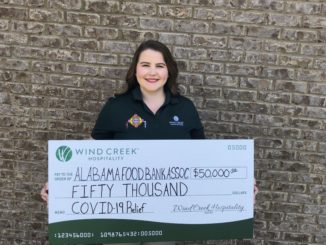Chris: In regards to the ongoing gaming compact negotiation with Governor Stitt – how has that impacted your operations? e.g., Are you looking at more Class II games?
Melanie: As of January 1st, 2020, Governor Stitt has stated that failure of the Tribes to renegotiate or renew their compacts with the state has resulted in all the Tribes in Oklahoma operating Class III gaming activities illegally. Yet Stitt never presented the Tribes with a proposal for negotiation.
While we discussed what would happen to our operations if we had to discontinue Class III games, we have not made any moves to bring in more Class II games. The Tribes in Oklahoma have been united on their stance that the compact automatically renewed January 1st. At this time there are several Tribes who have sued the Governor, and these lawsuits have been ordered to go to mediation at the end of the month. The Eastern Shawnee Tribe of Oklahoma still stands in agreement with the rest of the Tribes in Oklahoma, and we are prepared to take appropriate steps to stand in solidarity, no matter the outcome of this mediation.
Explain the timeline for reopening – how did you bring back team members, did you phase your reopening, what was the communication with your guests like prior to opening? When you were closed, did you have any team members to work with in PD or marketing?
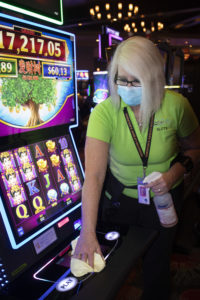 We decided early on in the beginning of the closure to work towards not just closing, but what reopening would look like, so with that in mind we knew that we had to choose the team that would help move us in that direction as soon as our doors closed. As with all best-laid plans, we found that we had to furlough more team members than we had originally planned, including leaders of different departments who were to be key members of our opening plan. As the first two tentative opening dates came and COVID-19 continued to spread in our area, we had to take a step back and re-examine our plan in order to grapple with the reality of the outbreak. We started looking at a three-phase opening that began with the gaming floor and food venues. The hotel and our smaller casino were planned for a later phase once we felt comfortable with knowing that COVID-19 had not spiked and our team as well as our guests were as safe as possible with the new protocols that we have implemented.
We decided early on in the beginning of the closure to work towards not just closing, but what reopening would look like, so with that in mind we knew that we had to choose the team that would help move us in that direction as soon as our doors closed. As with all best-laid plans, we found that we had to furlough more team members than we had originally planned, including leaders of different departments who were to be key members of our opening plan. As the first two tentative opening dates came and COVID-19 continued to spread in our area, we had to take a step back and re-examine our plan in order to grapple with the reality of the outbreak. We started looking at a three-phase opening that began with the gaming floor and food venues. The hotel and our smaller casino were planned for a later phase once we felt comfortable with knowing that COVID-19 had not spiked and our team as well as our guests were as safe as possible with the new protocols that we have implemented.
We found that the most effective communication strategy was one focused on brevity and transparency. With that dialogue came a lot of questions that guests wanted answered, and as we all know, with the uncertainty that we were all facing, what we planned for one day could and would change by the next.
I was able to keep the assistant general manager, marketing director, human resources manager, accounting manager and payroll. I also kept the food and beverage manager on to continue the restructure of that department that began before our closure, as well as our facilities manager and a couple of his team in order to complete tasks that we were not able to conduct due to possible disruption to business. We also began a remodel of our food court during this time using our own team in order to reduce cost. We managed to do a lot of work during this time with very minimal staffing.
How long did it take for you to procure PPEs and develop a plan to reopen? What was the most frustrating part and where did you receive guidance from?
We began the PPE procurement process well before we knew that our properties would close. Watching the rest of the world searching for masks, hand sanitizer, gloves and EPA-approved cleaning products made us realize that to keep our doors open we were going to have to purchase as much of these products as possible in the eventuality that they would become scarce. To date we are still having difficulties with getting some of these items delivered even though we purchased them weeks ago, but we do have a multitude of vendors, some of which are gaming vendors, which helps if we find that we cannot get what we need.
The plan to reopen has been developed, rethought and redeveloped throughout this entire experience, and it does shake your confidence a bit to think that you got it wrong the first time. But in speaking to numerous operators, vendors and partners such as Raving, I have found that plan wasn’t wrong, just fluid, and the entire industry was experiencing the same uncertainty and unpredictability of these times. We have all sat through Zoom sessions, webinars and conference calls weekly and sometimes daily to determine the best methods that would help us all open safely and with the continuity that we all were looking for. The first casinos to open were kind enough to share what they learned as they paved a way for all of us to rethink our plans. The lesson we’ve all learned through this is that regardless of the road map, we, as an industry, have to be adaptable. I have never been as proud to be part of this industry as I have after watching everyone working together to get our properties open, our teams back to work and our Tribes back on the road to stability.
Tell us about your first few weeks opening and what you’ve learned. What has been the most surprising? What has been the biggest challenge? Not to mention that you’ve had a tornado to deal with as well.
While we were closed we upgraded our backend system remotely. This went exceptionally well, but without all of our departments in place during testing, we knew that there would be some configuration challenges and training that we would have to handle quickly. We started with a controlled opening with invited guests, who were informed via email and calls from our player development team. This enabled us to relay to our guests that we were opening in order to train our team, work through bugs and give our team members the time to adjust to their new environment as well. We then opened to the public the next day without any announcement other than a Facebook post and word of mouth.
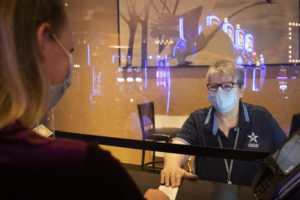 Communication was the key here, and all of the challenges we faced were tackled quickly by our leadership teams. They were brought in early so that we could establish an orderly chain of communication from the top down. We hold meetings three times a day with different shift managers, supervisors or leads attending from each department in order for us to glean from their experiences what we might have overlooked or did not properly prepare for. Those meetings are so beneficial and it has given all members of our leadership team the chance to participate in guiding the new way we do business. It also has the advantage of allowing us to more efficiently pass information down to the floor team members.
Communication was the key here, and all of the challenges we faced were tackled quickly by our leadership teams. They were brought in early so that we could establish an orderly chain of communication from the top down. We hold meetings three times a day with different shift managers, supervisors or leads attending from each department in order for us to glean from their experiences what we might have overlooked or did not properly prepare for. Those meetings are so beneficial and it has given all members of our leadership team the chance to participate in guiding the new way we do business. It also has the advantage of allowing us to more efficiently pass information down to the floor team members.
We reopened during a month that is well-known for severe weather, and with any type of warning or watch we have to be vigilant at all times to ensure the safety of our team and our guests. You add COVID-19 on top of a weather event and you can say goodbye to any semblance of social distancing when you have to evacuate the floor during tornado warnings. Evacuation plans are in place for team members who must follow the plan and move to their designated areas, but it is more difficult with guests who do not want to leave their machine, hotel room or be told that their dinner is going to have to wait. Our teams are trained to respond to all types of emergencies and they just added on how to execute with COVID-19 in the mix.
As we go to press, cases are still spiking in different areas of the country. How do you keep your head down, move forward and stay positive when there is still risk to elders who love to come and play?
We sit on the border of two different states with another state in close proximity as well. This puts us in a unique situation here as we have had to watch their individual stay-at-home orders, state of emergency proclamations and how the cases are surging or receding. With such variation on how the Governors are handling these things as well as their reopening strategies for their states, we have expended a lot of time and effort to manage the best possible strategies to keep our team members, guests, communities and our Tribal members safe. It becomes overwhelming at times, and if you think about it too much it becomes disruptive. Corresponding with my peers in the industry, Tribal leaders, and healthcare professionals has helped me focus and put some perspective on how to continue to grow with confidence that we are doing everything we can as we develop and redevelop our health and safety initiatives.
Now that you’ve been through closing and reopening, would you do anything differently if this were to happen again? How will you prepare for a potential second wave?
When this all first came to our attention and we prepared for closure, things moved quickly with so much information coming in from everywhere. It took me a while to determine who my best resources were and who was going to provide me with the information I needed in order to keep ahead of this and resume business as soon as possible.
How has living in a zone prone to tornadoes helped you with this emergency? e.g., Did you already have shutdown plans in place; is your security team a totally different caliber because they are used to emergency action?
We have a comprehensive Emergency Response Plan in place and all of our team members have been trained to respond as the plan dictates. Our security team has many roles here and they are highly trained in each role. They attend continuous training programs that were developed for our properties. They are proud of their ability to respond knowledgeably and quickly to all situations, whether it be fire, tornadoes, accidents or health-related incidents.
Many gaming organizations have said that this has given them the opportunity to “pivot”; to perhaps look at things that really needed to be changed that had been put off; to reevaluate reinvestment or other operations. Has there been a change of conversation in your organization?
When I took on the general manager role a year ago, I knew that many changes would have to be made. We have worked towards a lot of those changes and the closure has indeed created an opportunity for us to undertake those changes at a quicker pace than if we were fully operational.
Leadership, training and reinvestment have been at the top of the list. We have also looked at what roles have been redundant and have been able to combine those roles within the department. I’ve also identified certain practices that we’ve maintained over the years that are inefficient or outdated, but would cause fear or confusion if changed during normal times. The closure has given us the time and space to work out the kinks with the affected departments before we bring their team back. These changes have been well-received since our reopening, and we look forward to refining other protocols with this wind at our back.
As a Tribal member, a female business leader, a mother and a wife, you wear several hats. Has one role helped the other? Have you had any major “aha” moments?
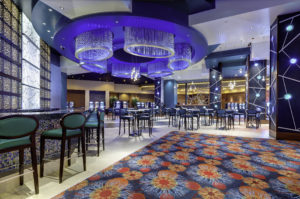 The roles of mother, wife, daughter, leader and Tribal member have shaped me throughout my entire life, and they coexist and inform each other in ways I never expected. I take each of them very seriously and I feel that my passion for hard work, the desire to succeed and the ability to teach and inspire along the way has always been who I am. I always felt it my duty to show my Tribe, my children and my teams that anything is possible and that you have to take chances and invest in yourself to make things happen.
The roles of mother, wife, daughter, leader and Tribal member have shaped me throughout my entire life, and they coexist and inform each other in ways I never expected. I take each of them very seriously and I feel that my passion for hard work, the desire to succeed and the ability to teach and inspire along the way has always been who I am. I always felt it my duty to show my Tribe, my children and my teams that anything is possible and that you have to take chances and invest in yourself to make things happen.
As I came up from the bingo floor and into a player development and marketing role, I never thought that I would be in the same league as well-educated and knowledgeable industry experts. When I was given the chance to take on the role of marketing director over three casinos in a highly competitive area, I did not feel like I was deserving or capable of that role. It was with encouragement from my mentor at the time that I realized that while I came into the position in a unique way, it didn’t mean that I was not capable of fulfilling the role, but rather I just had to open my mind to the fact I was taught how to market in a quickly changing casino landscape and my abilities were just a good as anyone else in this arena. The same holds true for when I accepted the general manager position, but when I gave it more thought, I knew that there was not a better person prepared to take the lead of this team at this time than me. I had developed departments, mentored, encouraged and promoted a lot of our team members, and I had a great relationship with our guests from my many years on the floor. Moving into both of these positions has enabled me to look closer at who I am and not who I am not.
You were able to keep your team members on payroll for three weeks; then they went on furlough and kept their benefits. You had mentioned unemployment was a nightmare for them. Through this process, is there anything that you have learned or would change if this happened again?
The Tribe committed to pay our furloughed team members throughout the first three weeks of closure. Once we found out that we would not be opening soon and there was no way of knowing when we could reopen, we furloughed 93% of our team members. We continue to pay all of their insurance as well as their dependents’ premiums through this time, but for some of our team members, collecting unemployment insurance has been a nightmare and, to date, we still have many who have not received a check since being furloughed.
The amount of time our human resources manager and myself have spent looking for solutions, answering questions, trying to ease fears and encouraging our team members to stay healthy and positive during this time has been eye-opening to say the least. Oklahoma has just recently moved towards revamping their website and claims process and hiring more agents to handle their archaic system, so we are hoping that these people get some relief quickly.
If there is a second wave or any other issue that would put us back in this type of situation, I feel that communication is key, our team members need to know, they need resources just like I did when I was thrust into this new world. We have listened and we have learned from our team members, and while we didn’t always have the answers, we made sure that they knew we were listening to them and we would help them in any way possible.
Throughout this entire crisis I have found that if you continue to work hard, have the ability to be flexible, communicate and surround yourself with a bigger network than you ever thought you would possibly need, anything is possible.

